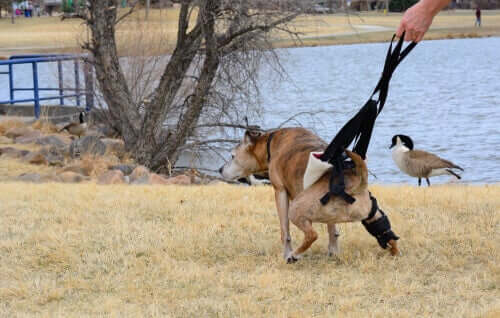Diets for Kidney Disease in Sick Dogs


Written and verified by the biotechnologist Alejandro Rodríguez
Just like humans, pets’ diets must adapt to their needs and characteristics when they’re suffering from kidney disease. However, the same goes for any other illness. In today’s article, we’re going to give you some tips on how to feed a sick dog.
Signs of kidney disease in dogs
The kidneys are the most important organs in all living things and their function is vital. This is because these organs are responsible for eliminating the toxins and waste of internal metabolic processes. Kidney function in dogs may fail due to various factors such as age, infections, etc.
There are several types of kidney disease and you can tell them apart depending on the symptoms and the affected area. Renal insufficiency is perhaps the most common in dogs and mainly caused by the progressive loss of this organs’ function.
It usually affects older dogs to a greater degree, and the balance of nutrient-wastes begins to unbalance due to kidney alteration. These then aren’t properly released through the urine.

Urinary infections and renal failure are some examples of kidney disease in dogs. These are quite serious when not detected in time. So, it’s clear that feeding dogs ailed by this condition should be the main way to control their balance of toxins and nutrients.
Diets for kidney disease – fatty acids
If your dog has a renal pathology your veterinarian will most likely suggest a special diet suited to their specific situation. One of the main components of this kind of dietary regime is fats. This is because food rich in omega 3 is an aid in blood filtration and thus improves kidney function.
A diet that includes bluefish is ideal because its content of omega 3 is quite high. Other good options are salmon, tuna and mackerel. Currently, there’s dog food specifically designed for this type of pathology and it usually includes fish oils and omega 3 supplements.
Control the intake of phosphorus and sodium
Despite being a vital mineral for the formation of bones and teeth, phosphorus intake in cases of renal insufficiency can prove excessive. This is because phosphorus isn’t easily processed and merely accumulates. This, in turn, could lead to cardiovascular and renal insufficiency. Thus, the pet must follow a low phosphorus diet so as to not overwork their kidneys.

Sodium requires even tighter adjustment. Because, while it’s true that an excess of sodium can lead to additional blood pressure problems, its total restriction is also quite harmful.
Diets for kidney disease – protein intake
Proteins are an indispensable part of the nutrients that a dog’s body needs to perform its normal functions. However, you must be careful when it comes to animals with renal pathologies. This is because the breakdown of proteins releases nitrogen compounds and phosphorus, and the kidneys must process them.
In addition, the protein intake must be of high quality and animal origin. Pet food options that provide this type of protein in moderate amounts is now at your fingertips. Or, if you prefer a homemade diet, you could always include chicken as one of the main ingredients.
Finally, seek professional advice as it’s always the best cure for your pet.
https://misanimales.com/dietas-especificas-perros-padecen-enfermedad-renal/
All cited sources were thoroughly reviewed by our team to ensure their quality, reliability, currency, and validity. The bibliography of this article was considered reliable and of academic or scientific accuracy.
- Elliott, D., & Lefebvre, H. (2006). Insuficiencia renal crónica: importancia de la nutrición. Enciclopedia de la Nutrición Clínica canins. Ed. Pibot P, Biourge V, Elliot D, editores. Aniwa SAS Royal Canin, Aimarges, Francia, 268-298.
- Pibot, P., Biourge, V., & Elliott, D. (2006). Enciclopedia de la nutrición clínica canina (No. 619: 636.045). Royal Canin,.
This text is provided for informational purposes only and does not replace consultation with a professional. If in doubt, consult your specialist.